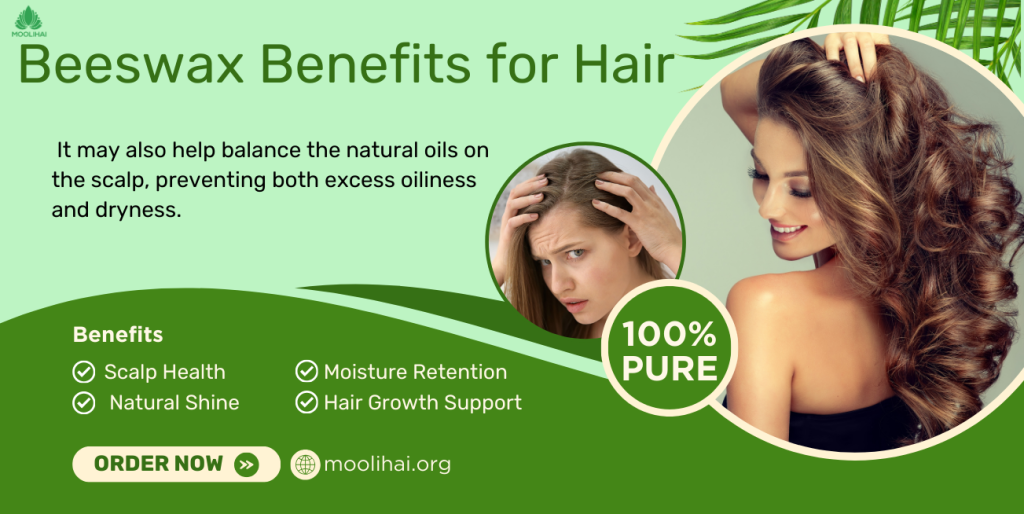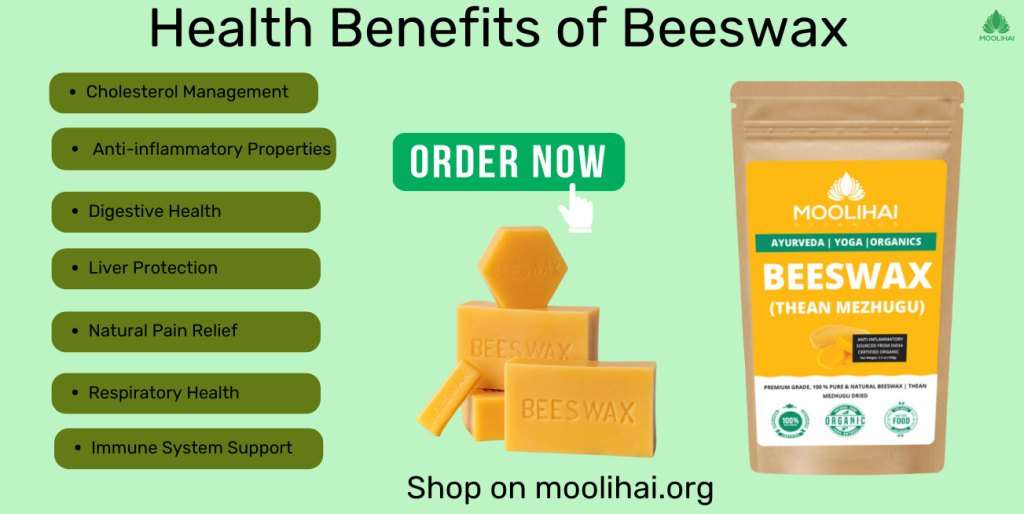Herb
Beeswax: Uses & Benefits of Beeswax for Hair, Face & Skin
Eventhough beeswax has been used for thousands of years, it is a product that is very famous recently.
At Naturoherbs, we love supplying genuine natural products and our Naturoherbs Beeswax product is a testament to that commitment.
In this guide, we’ll explore beeswax, uncovering its uses and benefits for skin, hair, health, and more.
Whether you’re a skincare enthusiast, a health-conscious individual, or simply curious about this golden wonder, read below to find the benefits of beeswax.
What is Beeswax?
Beeswax is a natural wax produced by honey bees of the genus Apis. These insects secrete wax from special glands on their abdomens, which they then use to construct the honeycomb structure of their hives.
The process is truly remarkable – worker bees consume about eight times as much honey to produce just one pound of beeswax, flying an estimated 150,000 miles in the process!
The composition of beeswax is complex, containing over 280 different compounds. It’s primarily made up of esters (45-55%), hydrocarbons (15-18%), free fatty acids (10-15%), diesters and complex esters (8-12%), hydroxy monoesters (4-6%), and free fatty alcohols (1-2%).
This unique chemical makeup gives beeswax its characteristic malleability, water-repellent properties, and low melting point (around 62-64°C), making it incredibly versatile for various applications.

Interestingly, the color of beeswax can vary from white to yellow to brown, depending on the pollen and nectar sources collected by the bees. The presence of propolis, a resinous mixture that bees collect from tree buds, sap flows, or other botanical sources, also influences the color and properties of beeswax.
At Naturoherbs, we carefully source our beeswax to ensure the highest quality for our products. The natural, unbleached yellow beeswax we use retains all its beneficial properties, providing you with the purest form of this golden treasure.
Beeswax Benefits for Skin
One of the most celebrated uses of beeswax is in skincare, and for good reason. Its natural properties make it an excellent ingredient for nourishing and protecting your skin. Here’s why beeswax is a skincare superstar:

1. Natural Moisturizer: Beeswax acts as an emollient, forming a protective layer on the skin that helps lock in moisture. This makes it particularly effective for dry, chapped skin, keeping it hydrated and supple. Unlike petroleum-based products, beeswax allows the skin to breathe while still providing excellent hydration.
2. Healing Properties: The anti-inflammatory and antibacterial properties of beeswax make it beneficial for healing minor skin irritations, cuts, and burns. It can help soothe angry skin and promote faster healing. These properties are attributed to the presence of vitamin A and other natural compounds in beeswax.
3. Barrier Protection: Beeswax creates a breathable barrier on the skin, protecting it from environmental pollutants and irritants while still allowing the skin to function normally. This makes it an excellent ingredient for products designed to shield the skin from harsh weather conditions or urban pollution.
4. Non-Comedogenic: Unlike some synthetic waxes, beeswax doesn’t clog pores, making it suitable for all skin types, including acne-prone skin. It can even help in managing acne by creating a protective barrier that keeps out dirt and bacteria without trapping oils.
5. Rich in Vitamin A: Beeswax contains vitamin A, which supports cell turnover and helps maintain healthy skin. This can contribute to a more youthful, radiant complexion. Vitamin A is known for its ability to promote skin renewal and improve skin texture.
6. Anti-Aging Properties: The antioxidants present in beeswax can help fight free radical damage, potentially slowing down the aging process of the skin. Regular use of beeswax-based products may help reduce the appearance of fine lines and wrinkles.
7. Hypoallergenic Nature: Beeswax is generally well-tolerated by most skin types and is less likely to cause allergic reactions compared to many synthetic ingredients. This makes it an excellent choice for those with sensitive skin.
At Naturoherbs, we harness these skin-loving properties in our beeswax products, helping you achieve naturally beautiful, healthy skin.
Beeswax for Hair: Nourishment from Root to Tip
While less commonly known, beeswax also offers significant benefits for hair care:
1. Natural Styling Aid: Beeswax can help tame flyaways and add texture to hair, making it useful for creating various hairstyles, especially for those with natural or textured hair. It provides a flexible hold without the stiffness associated with many commercial hair products.
2. Moisture Retention: Similar to its effect on skin, beeswax can help lock moisture into hair strands, preventing dryness and breakage. This is particularly beneficial for those with dry or damaged hair.
3. Scalp Health: The antibacterial properties of beeswax can contribute to a healthier scalp environment, potentially reducing issues like dandruff or scalp irritation. It may also help balance the natural oils on the scalp, preventing both excess oiliness and dryness.
4. Hair Growth Support: While not directly promoting hair growth, beeswax can help create a healthier environment for hair to grow by nourishing the scalp and protecting hair strands. By reducing breakage and split ends, it can contribute to the appearance of fuller, longer hair over time.
5. Natural Shine: Beeswax can add a natural sheen to hair without the greasy feel of some commercial hair products. This can make hair look healthier and more vibrant.
6. Protection from Environmental Damage: The protective properties of beeswax extend to hair as well. It can help shield hair from sun damage, pollution, and other environmental stressors that can lead to dryness and damage.
7. Frizz Control: For those battling frizzy hair, beeswax can be a game-changer. It helps smooth the hair cuticle, reducing frizz and flyaways, especially in humid conditions.

Other Health Benefits of Beeswax
Beyond its external applications, beeswax has been used for centuries for its potential health benefits:
1. Cholesterol Management: Some studies suggest that very long-chain fatty alcohols found in beeswax may help lower LDL (bad) cholesterol and raise HDL (good) cholesterol levels. A study published in the “Journal of Food Lipids” found that beeswax alcohols could lower LDL cholesterol by 21% to 29% and raise HDL cholesterol by 8% to 15%.
2. Anti-inflammatory Properties: The anti-inflammatory effects of beeswax may help relieve pain and swelling when applied topically. This makes it a popular ingredient in balms and salves for muscle and joint pain.
3. Digestive Health: In traditional medicine, small amounts of beeswax have been consumed to help relieve digestive issues like diarrhea and ulcers. However, it’s important to note that large amounts should not be ingested. The exact mechanism is not fully understood, but it’s thought that beeswax may help form a protective coating in the digestive tract.
4. Liver Protection: Some research indicates that certain compounds in beeswax may have liver-protective effects, though more studies are needed to confirm this. A study published in the Korean Journal of Internal Medicine found that a mixture containing beeswax alcohol helped normalize liver function in patients with fatty liver disease.
5. Natural Pain Relief: When combined with other ingredients like honey and olive oil, beeswax can be used in salves to help relieve minor aches and pains. The warmth generated when rubbing these salves into the skin can also contribute to their pain-relieving effects.
6. Respiratory Health: Some people use beeswax candles to help purify the air and potentially alleviate symptoms of asthma and allergies. While scientific evidence is limited, proponents claim that burning beeswax candles releases negative ions that can help clean the air of dust, pollen, and other pollutants.
7. Immune System Support: While not directly boosting the immune system, the antibacterial and anti-inflammatory properties of beeswax can support overall health by helping to fight off pathogens and reduce inflammation in the body.

8. Treating Skin Conditions: Beeswax, often combined with honey and olive oil, has been used to treat conditions like eczema, psoriasis, and diaper rash. A study published in the Journal of Drugs in Dermatology found that a mixture of honey, beeswax, and olive oil was effective in managing atopic dermatitis and psoriasis.
9. Wound Healing: Its antibacterial properties make beeswax useful in wound dressings to promote healing and prevent infection. In ancient Egypt, beeswax was a key ingredient in many medicinal preparations for wound care.
10. Nasal Congestion Relief: In some traditional practices, beeswax candles have been used to help clear nasal passages. This practice, known as ear candling, involves placing a hollow candle in the ear canal and lighting the other end, although its effectiveness is debated in modern medicine.
11. Fungal Infections: Topical applications of beeswax mixtures have been used to treat fungal skin infections like athlete’s foot. The antifungal properties of beeswax, combined with its ability to create a protective barrier, make it potentially useful in managing these conditions.
12. Arthritis Relief: Some people find relief from arthritis pain by using beeswax-based balms or salves. The warming effect of these products, combined with the anti-inflammatory properties of beeswax, may help alleviate joint pain and stiffness.
13. Dental Applications: Interestingly, beeswax has a long history in dental care. Archeologists have found evidence of beeswax being used as a dental filling in a 6500-year-old human tooth, making it possibly the earliest known dental filling.
14. Hemorrhoid Treatment: In traditional medicine, beeswax has been used in suppositories and ointments to treat hemorrhoids. Its soothing and anti-inflammatory properties may help reduce discomfort associated with this condition.
Other Uses of Beeswax
The use of beeswax extends far beyond skincare and health applications:
1. Natural Candles: Beeswax candles burn cleaner and brighter than paraffin candles, emitting a subtle honey scent. They also produce negative ions when burned, which may help clean the air of dust, odors, and toxins.
2. Food Preservation: Beeswax can be used to coat cheese, preventing mold growth and moisture loss. This traditional method of preservation is still used by some artisanal cheese makers today.
3. Wood Treatment: It’s excellent for treating and preserving wood, giving it a beautiful shine and protective coating. Beeswax can help prevent wood from drying out, cracking, or becoming damaged by water.
4. Eco-friendly Food Wraps: Beeswax-coated fabric can be used as a reusable, biodegradable alternative to plastic wrap. These wraps are becoming increasingly popular as people seek to reduce their plastic usage.
5. Crafts and Art: From batik fabric dyeing to lost-wax casting in jewelry making, beeswax plays a role in various artistic techniques. It’s also used in encaustic painting, a technique that involves using heated beeswax to which colored pigments are added.
6. Leather Conditioning: Beeswax is an excellent natural leather conditioner. It helps waterproof leather goods and keeps them supple, extending their lifespan.
7. Musical Instruments: Beeswax is used to lubricate the valves of brass instruments and the strings of bowed instruments like violins. It’s prized for its ability to provide smooth movement without leaving a sticky residue.
8. Sewing and Tailoring: Thread can be run through beeswax to strengthen it and prevent tangling. This technique has been used by tailors and seamstresses for centuries.
9. Surfboard Wax: Surfers use beeswax-based waxes to create a non-slip surface on their boards, allowing for better traction on the waves.
10. Natural Lubricant: In woodworking and DIY projects, beeswax can be used as a natural lubricant for drawer slides, zippers, and other moving parts.
Potential Side Effects of Beeswax
While beeswax is generally safe for most people, there are a few considerations to keep in mind:
1. Allergies: Some individuals may be allergic to bee products, including beeswax. Always perform a patch test before using a new beeswax product. Symptoms of an allergic reaction can include redness, itching, swelling, or in severe cases, difficulty breathing.
2. Ingestion: While small amounts of beeswax are generally considered safe to eat, large quantities can cause digestive issues such as intestinal blockages. It’s important to remember that while beeswax is non-toxic, it’s not digestible by the human body.
3. Pregnancy and Breastfeeding: There’s insufficient research on the safety of beeswax for pregnant or breastfeeding women, so it’s best to consult with a healthcare provider before use. While topical use is likely safe, ingestion should be avoided unless approved by a doctor.
4. Interactions: If you’re taking medications or have specific health conditions, check with your doctor before using beeswax medicinally. While interactions are rare, it’s always better to err on the side of caution.
5. Quality Matters: The benefits of beeswax can vary depending on its quality and processing. Always choose high-quality, pure beeswax products like those we offer at Naturoherbs. Some commercially available beeswax products may be mixed with cheaper alternatives or subjected to extensive processing, which can reduce their beneficial properties.
6. Environmental Considerations: While beeswax is a natural and renewable resource, it’s important to source it responsibly. Ensure that your beeswax comes from beekeepers who practice sustainable and ethical beekeeping methods.
7. Melting Point: Beeswax has a relatively low melting point (around 62-64°C). Products containing beeswax may soften or melt if exposed to high temperatures, so proper storage is important.
8. Cost: Pure, high-quality beeswax can be more expensive than synthetic alternatives. However, many users find that the benefits and versatility of beeswax justify the higher cost.
Beeswax truly is nature’s golden wonder. Its benefits for skin, hair, and health, coupled with its usage in various products, make it a valuable natural resource.
At Naturoherbs, we’re proud to offer our high-quality Naturoherbs Beeswax product, allowing you to experience the many benefits of this remarkable substance.
Whether you’re looking to enhance your skincare routine, explore natural remedies, or simply incorporate more eco-friendly products into your life, beeswax offers a wealth of possibilities.
We hope this guide has illuminated the many facets of beeswax and inspired you to explore its potential in your own life.

Nature often provides the best solutions, and beeswax is a shining example of this principle. So why not give it a try? Your skin, hair, and overall well-being might just thank you for it!
At Naturoherbs, we’re committed to bringing you the highest quality natural products, and our beeswax is no exception. Try our beeswax yourself and let us know your experience.
